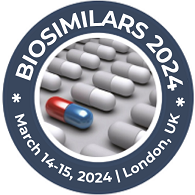Biosimilars for Rare Diseases
Biosimilars are biological products that are highly similar to an already approved reference biologic, known as the originator or reference product. Biosimilars are developed to have a comparable quality, safety, and efficacy profile to the reference product.
Here are some key points about biosimilars:
Regulatory Approval: Biosimilars undergo a rigorous regulatory approval process to demonstrate their similarity to the reference product. The specific requirements for approval may vary across countries, but they generally involve extensive analytical and clinical studies to establish biosimilarity.
Similarity not Identical: Biosimilars are not identical copies of the reference product but are highly similar in terms of quality attributes, biological activity, and clinical performance. Minor differences may exist due to the inherent complexity of biologics and the manufacturing process, but these differences are not clinically meaningful.
Related Conference of Biosimilars for Rare Diseases
Biosimilars for Rare Diseases Conference Speakers
Recommended Sessions
Related Journals
Are you interested in
- 3D Structure Determination - Structural Biology-2026 (France)
- Advanced Drug Delivery Systems for Metabolic Therapy - DRUG CHEMISTRY CONF 2026 (France)
- Advanced Techniques in Structural Biology - Structural Biology-2026 (France)
- AI & Computational Structural Biology - Structural Biology-2026 (France)
- Biochemistry and Biophysics - Structural Biology-2026 (France)
- Biomarker-Guided Drug Development - DRUG CHEMISTRY CONF 2026 (France)
- Chemical Biology Tools in Metabolic Research - DRUG CHEMISTRY CONF 2026 (France)
- Computational Approach in Structural Biology - Structural Biology-2026 (France)
- Computational Drug Design and Molecular Modeling - DRUG CHEMISTRY CONF 2026 (France)
- Drug Designing and Biomarkers - Structural Biology-2026 (France)
- Drug Resistance and Therapeutic Durability - DRUG CHEMISTRY CONF 2026 (France)
- Enzyme Modulation Approaches in Antidiabetic Drug Design - DRUG CHEMISTRY CONF 2026 (France)
- Epigenetic Regulation and Small-Molecule Therapeutics - DRUG CHEMISTRY CONF 2026 (France)
- Future Directions in Drug Chemistry for Diabetes Management - DRUG CHEMISTRY CONF 2026 (France)
- Hybrid Approaches for Structure Prediction - Structural Biology-2026 (France)
- Lipid Chemistry and Metabolic Regulation - DRUG CHEMISTRY CONF 2026 (France)
- Medicinal Chemistry Strategies for Metabolic Disorders - DRUG CHEMISTRY CONF 2026 (France)
- Membrane Proteins and Receptors - Structural Biology-2026 (France)
- Molecular Modelling and Dynamics - Structural Biology-2026 (France)
- Natural Product Chemistry in Diabetes Drug Discovery - DRUG CHEMISTRY CONF 2026 (France)
- Oxidative Stress Modulation through Drug Chemistry - DRUG CHEMISTRY CONF 2026 (France)
- Peptide and Protein-Based Drug Chemistry - DRUG CHEMISTRY CONF 2026 (France)
- Pharmacokinetics and Drug Metabolism Studies - DRUG CHEMISTRY CONF 2026 (France)
- Prodrug Design and Chemical Activation Strategies - DRUG CHEMISTRY CONF 2026 (France)
- Proteomics and Genomics - Structural Biology-2026 (France)
- Regulatory Chemistry and Drug Safety Assessment - DRUG CHEMISTRY CONF 2026 (France)
- Structural Bioinformatics and Computational Biology - Structural Biology-2026 (France)
- Structural Biology in Cancer Research - Structural Biology-2026 (France)
- Structural Virology - Structural Biology-2026 (France)
- Structural Virology and Infectious Diseases - Structural Biology-2026 (France)
- Structure-Based Drug Discovery - Structural Biology-2026 (France)
- Structure-Based Solutions to Global Health Challenges - Structural Biology-2026 (France)
- Structure-Function Relationships - Structural Biology-2026 (France)
- Structure–Activity Relationship Studies in Drug Chemistry - DRUG CHEMISTRY CONF 2026 (France)
- Synthetic Chemistry Innovations in Drug Development - DRUG CHEMISTRY CONF 2026 (France)
- Targeting Pancreatic Function through Drug Chemistry - DRUG CHEMISTRY CONF 2026 (France)
- The Structural Basis of Disease - Structural Biology-2026 (France)
- Translational Drug Chemistry from Bench to Clinic - DRUG CHEMISTRY CONF 2026 (France)

